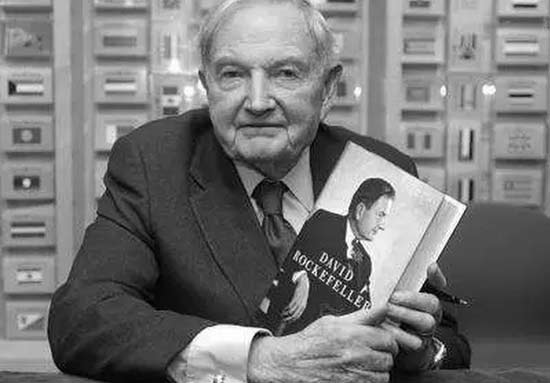

 |
| File photo |
Unofficial exchanges crucial to development of Sino-US relations
As many in the US mourned the death of banker and philanthropist David Rockefeller, a top hospital in China joined in the remembrance for the business tycoon.
After Rockefeller passed away on Monday at the age of 101, Peking Union Medical College Hospital (PUMCH) in Beijing posted an article on its official Sina Weibo account with the title "Thanks to Rockefeller family for establishing the best hospital in China." The article reviewed the founding of PUMCH and thanked the Rockefeller family for their contribution to the development of medical services in China.
Experts say the contribution of the Rockefeller family to China's medical services is only part of the people-to-people exchanges between China and the US, which have lasted through the times and reflect the strong and historical foundation of friendship between the two counties.
The hospital, a "Class-A tertiary comprehensive hospital," was officially established in 1921, with funding from the Rockefeller Foundation. From the very beginning, it was intended to be built into the "best medical center in Asia." From 2009 to 2015, PUMCH has consecutively topped the "Best Hospital Ranking in China," published by the Hospital Management Institute of Fudan University.
According to the statement, the Rockefeller Foundation provided $10 million from 1913 to 1923 to establish the hospital, which is more than its $7 million expenditure on John Hopkins University. Since then, the hospital has educated many elites in medicine who contributed to and witnessed the modernization of China's medical and public health sector.
At present, PUMCH still has close relations with the Rockefeller Foundation. David Rockefeller Jr., the son of David Rockefeller, visited PUMCH in 2011 and expressed his willingness to deepen cooperation with PUMCH in the future, the article said.
PUMCH is just one example of Sino-US non-governmental exchanges, and there have been many such remarkable examples of educational cooperation in the past.
Yenching University, which was open from 1919 to 1952 in Beijing, was jointly built by US and UK Christian churches. It was divided into different parts and merged with several universities, including Tsinghua University, Peking University and the Renmin University of China, with its medical school merging into PUMCH.
In 2013, Stephen A. Schwarzman, chairman of the Blackstone Group, funded $100 million to establish and endow a scholarship program in China, the Schwarzman Scholars, and built the Schwarzman College at Tsinghua University.
An anonymous Schwarzman Scholar from the US told the Global Times that 100 years ago, the US acted as the provider of education to Chinese students, but today, the situation has changed and many Americans come to China for study. "As an American student, I have to say we are also hungry to learn about China and learn from China," he said.
"The Schwarzman College is built not just for China and the US. We have students from almost every continent except Antarctica, so this program shows that Sino-US friendship and cooperation does not only serve the two countries, but also the rest of the world," he added.
The legacies of China-US friendship and people-to-people exchanges are everywhere and are still serving the people of the two countries today.
"China and the US are each other's biggest source of overseas students, and this proves that no matter how the political relationship is - bad or good, cold or warm - the people-to-people exchanges between the two countries can't be stopped," said An Gang, a US studies expert and member of the Pangoal Institution, a Beijing-based think tank.
Unofficial exchanges are very important for Sino-US relationship. "During the Cold War, we saw that the Ping-Pong Diplomacy kicked off the engagement for both countries who used to be enemies of each other. When the two countries' diplomatic relationship faces challenges, people-to-people exchanges help break the deadlock and contribute to the recovery of the bilateral ties."
So, for the friendship between Chinese and US people, both governments should do their best to keep the bilateral relationship stable and take ties to a new height, An said.
 Fire brigade in Shanghai holds group wedding
Fire brigade in Shanghai holds group wedding Tourists enjoy ice sculptures in Datan Town, north China
Tourists enjoy ice sculptures in Datan Town, north China Sunset scenery of Dayan Pagoda in Xi'an
Sunset scenery of Dayan Pagoda in Xi'an Tourists have fun at scenic spot in Nanlong Town, NW China
Tourists have fun at scenic spot in Nanlong Town, NW China Harbin attracts tourists by making best use of ice in winter
Harbin attracts tourists by making best use of ice in winter In pics: FIS Alpine Ski Women's World Cup Slalom
In pics: FIS Alpine Ski Women's World Cup Slalom Black-necked cranes rest at reservoir in Lhunzhub County, Lhasa
Black-necked cranes rest at reservoir in Lhunzhub County, Lhasa China's FAST telescope will be available to foreign scientists in April
China's FAST telescope will be available to foreign scientists in April "She power" plays indispensable role in poverty alleviation
"She power" plays indispensable role in poverty alleviation Top 10 world news events of People's Daily in 2020
Top 10 world news events of People's Daily in 2020 Top 10 China news events of People's Daily in 2020
Top 10 China news events of People's Daily in 2020 Top 10 media buzzwords of 2020
Top 10 media buzzwords of 2020 Year-ender:10 major tourism stories of 2020
Year-ender:10 major tourism stories of 2020 No interference in Venezuelan issues
No interference in Venezuelan issues
 Biz prepares for trade spat
Biz prepares for trade spat
 Broadcasting Continent
Broadcasting Continent Australia wins Chinese CEOs as US loses
Australia wins Chinese CEOs as US loses